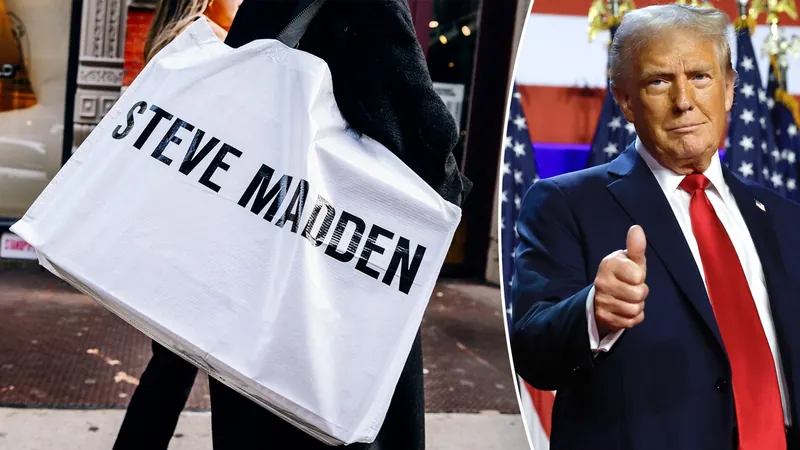
Steve Madden's Bold Move: Ditching China Amid Tariff Fears Post-Trump Victory
2024-11-08
Author: Wai
Steve Madden's Strategic Shift
In a swift response to the economic climate shaped by President-elect Donald Trump's impending tariffs, the iconic footwear brand Steve Madden is planning a significant shift in its production strategy, aiming to cut its reliance on Chinese manufacturing.
Reduction of Chinese Sourcing
During a recent earnings call, CEO Edward Rosenfeld revealed that the company has initiated a plan to decrease its Chinese sourcing by an impressive 45% in the near future. "You should expect to see the percentage of goods that we source from China to begin to come down more rapidly going forward," he stated, emphasizing the need to adapt to the potential economic consequences of Trump's presidency.
Exploring New Manufacturing Bases
As the shoe retailer pivots away from China, it is increasingly looking to establish factory bases in countries such as Brazil, Mexico, Vietnam, and Cambodia. This geographical shift is not only a strategic response to tariffs but also a move to diversify its supply chain in a volatile global economy.
Concerns Over Tariffs
With fears that a substantial portion of Steve Madden’s products could be subject to new tariffs—an estimated 40% to 45%—company executives are preparing for potential increases in costs if Trump follows through with his proposed trade policies. Reports indicate that Trump may impose a 20% tariff on goods from countries involved in trade conflicts, and as high as 200% on imports from specific regions, including Mexico.
Economic Perspectives on Tariffs
Market analysts and economists have mixed views on Trump's tariff strategy. John Lonski, President and founder of The Lonski Group, commented that tariffs may serve more as a bargaining tool than a punitive measure. He suggested that these levies could drive negotiations with China, encouraging fairer trade practices without broadly punishing other countries.
Implications for American Manufacturing
Lonski also pointed out the broader macroeconomic implications of relying heavily on foreign manufacturing, particularly concerning America's national security and vital industries like pharmaceuticals. "We can't become overly reliant on foreign supplies," he added, underlining the importance of reshoring critical manufacturing processes.
Conclusion: A New Era for American Manufacturing
In the face of these unfolding economic realities, Steve Madden's proactive stance reveals a broader industry response to the uncertainties looming over international trade, marking a new era for American manufacturing and sourcing strategies.


 Brasil (PT)
Brasil (PT)
 Canada (EN)
Canada (EN)
 Chile (ES)
Chile (ES)
 España (ES)
España (ES)
 France (FR)
France (FR)
 Hong Kong (EN)
Hong Kong (EN)
 Italia (IT)
Italia (IT)
 日本 (JA)
日本 (JA)
 Magyarország (HU)
Magyarország (HU)
 Norge (NO)
Norge (NO)
 Polska (PL)
Polska (PL)
 Schweiz (DE)
Schweiz (DE)
 Singapore (EN)
Singapore (EN)
 Sverige (SV)
Sverige (SV)
 Suomi (FI)
Suomi (FI)
 Türkiye (TR)
Türkiye (TR)